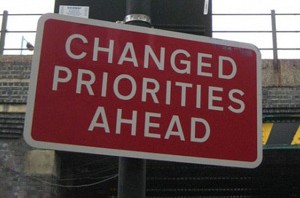In her second guest post, Dr. Robyn Odegaard discusses how shifting your mindset will improve your life and schedule for the better.
How many times a day do you hear or say (or even think), “I don’t have time” or “I’m too busy.”?
Our schedules have become such a huge part of our culture that “busy” has come to be an acceptable response to the question, “How are you?” When did we all become so lousy at time management that the default excuse “I haven’t had time” began to be met with understanding nods and even with forgiveness for failure to deliver on promises?
 Do not think that I am pointing fingers at anyone. I’m just as guilty of using the “no-time” excuse as anyone else is. To provide a remedy for this situation, I might suggest the practice of time management skills such as time blocking, keeping lists, and moving swiftly from one task to the next, but most likely you’ve heard it all before and it probably hasn’t helped.
Do not think that I am pointing fingers at anyone. I’m just as guilty of using the “no-time” excuse as anyone else is. To provide a remedy for this situation, I might suggest the practice of time management skills such as time blocking, keeping lists, and moving swiftly from one task to the next, but most likely you’ve heard it all before and it probably hasn’t helped.
So instead, I’d like to share my views on how the way I’ve come to think and talk about time has changed my life (and has helped me prioritize my schedule) for the better.
Here is my discovery:
- We make time for things we consider important to ourselves, our boss, our co-workers, our teammates, our significant others, and our children
- Time is our most valuable and limited asset; once it is spent, we cannot get it back. Therefore, it is logical to assume that the things we spend time on are those most important to us. And the things we allow to fall by the wayside, because of time constraints, are less important, right? Hmm…well, maybe not.
Here is a subtle change I’ve made in my thinking, and the challenge I pose to you:
These days, instead of flippantly saying, “I haven’t had time” and accepting the easy out it gives me, I’ve learned to say, “I haven’t made that a priority.”
This simple shift in emphasis never fails to give me a moment’s pause. Gone is the easy, familiar excuse. Now, in its place, is the accountability I must confront: to commit myself to the things most important to me and to disregard or postpone the things less important.
If I can legitimately say without guilt or regret that a particular item or event on my list is not a genuine priority, then I know I can place it in the “no” category. On the other hand, if I do feel that nagging twinge one feels when putting off a task that needs to be completed, then I know that I must reconsider my priorities.
Each of us in life is allotted the same 24 hours in a day. The difference between owning the clock and having the clock own us comes down, I believe, to our mental approach.
Changing how we talk about time can change how we think about time and, ultimately, how we manage the time we’ve been given.
How might taking away the accepted excuse of not having enough time and admitting, “I haven’t made that a priority,” affect how you manage your schedule? What if someone were to say it to you?
Dr. Robyn Odegaard (aka Doc Robyn) is a nationally known speaker/consultant/writer who is passionate about meeting people where they are and helping them advance to where they want to be. She holds a doctorate in psychology and is the CEO of the Champion Performance Development (www.ChampPerformance.com) where she combines executive coaching, organizational development, sport psychology and her love for public speaking to show her clients how they can achieve greater success in every aspect of their lives. She founded the Stop The Drama! Campaign, authored the book ‘Stop The Drama!’ (www.StopTheDramaNow.com) and speaks at high schools and colleges to provide the skills proven to produce success for her clients to students. She is avid in her support of driven, high performers and lives by the motto, “Worst case, I want to be a neutral to everyone I meet. My goal is to make a positive difference.”








